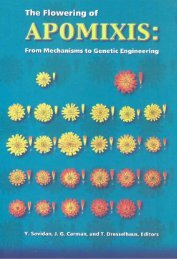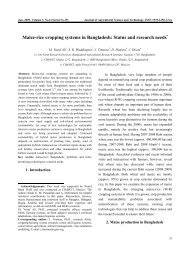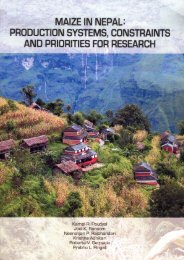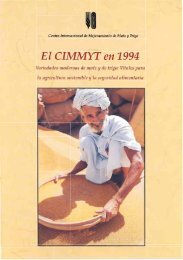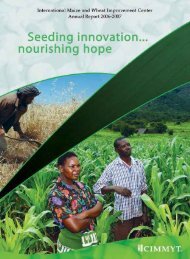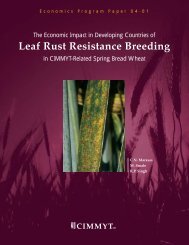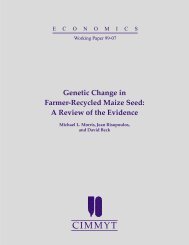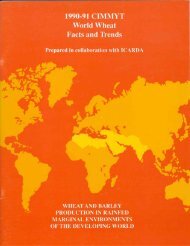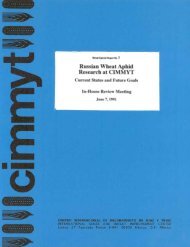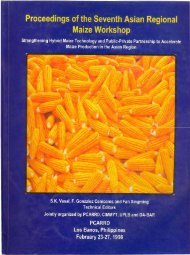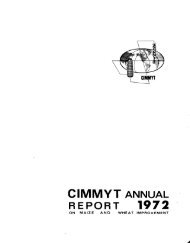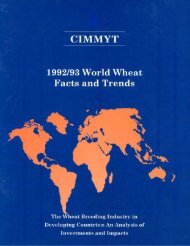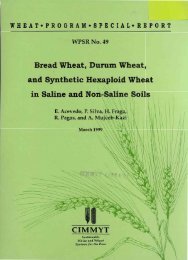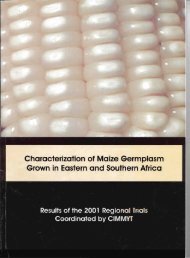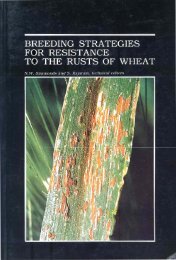REPORT - Search CIMMYT repository
REPORT - Search CIMMYT repository
REPORT - Search CIMMYT repository
Create successful ePaper yourself
Turn your PDF publications into a flip-book with our unique Google optimized e-Paper software.
which removed the leaves during the filling<br />
stage. Lerma Rojo 64 was much more severely<br />
damaged. In addition to loss of leaves,<br />
the neck and head were also attacked. This<br />
will result in a marked reduction in yield for<br />
this variety. Certain Italian, French and other<br />
varieties showed excellent resistance and will<br />
be used in hybridization work. In the Sea of<br />
Marmora Region of the north, mildew appeared<br />
to be quite serious. Varieties were not killed,<br />
but suffered some reduction in yield. Leaf<br />
rust was present, but of only minor importance.<br />
Stripe rust was essentially absent during<br />
the year.<br />
Such disease attacks, point up the real<br />
need for the production program to be supported<br />
by adequate research. Varietal shortcomings<br />
can then be identified before heavy<br />
losses are encountered in the production field.<br />
In 1969, the Ministry of Agriculture of the<br />
Government of Turkey and the Rockefeller<br />
Foundation, entered into an agreement for the<br />
founding of a Cooperative Center of Research<br />
and Training in Wheat Improvement for Turkey<br />
and the Neighboring Countries.<br />
After initial delays, the program is to get<br />
underway in July under the joint direction of<br />
Dr. Ahmet Demir.licakmak for the Government<br />
and Dr. B. C. Wright for the Foundation. Staff<br />
members of Oregon State University, especially<br />
Dr. Warren Kronsted and Dr. M. Bolton, are<br />
associated. The program envisages a coordinated,<br />
mUlti-discipline approach to the problem<br />
of obtaining higher yields. Aspects of<br />
spring and winter bread and durum wheat research<br />
will be undertaken. It is anticipated<br />
that this center will become a major force for<br />
change, not only in Turkey but other countries<br />
of the region. Its activities will be closely associated<br />
with those of <strong>CIMMYT</strong> and country<br />
program' with which it is interlinked. The<br />
spring-winter hybridization program of Dr. J. A.<br />
Rupert, <strong>CIMMYT</strong> staff member at the University<br />
of California, will have particular application<br />
on the Anatolian Plateau, and also to the<br />
Iranian Plateau.<br />
Turkey has a co,?siderable number of<br />
trained, competent research scientists who<br />
have wheat materials 'at different stages of<br />
development. Stations near the coast are naturally<br />
working with spring type wheats while<br />
those in the interior have winter wheat programs.<br />
In the latter case a large number of<br />
winter varieties are under test or multiplication.<br />
The Russian variety Bezostaya, which proved<br />
superior in the First International Winter<br />
Wheat trial is being increased on a major scale.<br />
Other Russian varieties Mironovskaja, Odeskaja<br />
and Harkovskaja and the American varieties<br />
Brevor, Gaines, Nugaines, Wanser, Warrior,<br />
Gage, Scout, Lancer and the French variety<br />
Druchamp are under test and preliminary increase.<br />
A considerable number of experimental<br />
lines developed at Eskesehir look promising.<br />
Research, however, must be reorganized. All<br />
disciplines must jointly concern themselves<br />
with solving problems, each contributing its<br />
own parts of the answer. In the present system<br />
disciplines are separated. Under such an arrangement,<br />
the body of knowledge concerning<br />
a problem are not or cannot be brought together<br />
to give a full solution.<br />
In 1969-70, rainfall in Turkey was abnormally<br />
low. This was true not only of Turkey,<br />
but of a wide belt-extending eastward through<br />
Iran, Afghanistan and the Kashmir. Many consider<br />
it the worst drought of recent history.<br />
As a result, barring late rains, many fields of<br />
the Anatolian Plateau can be expected to give<br />
little or no yield. The shortage of wheat will<br />
lead to greater than normal import needs.<br />
There is some danger from the possible expansion<br />
of spring wheat dwarfs into the Anatolian<br />
Plateau where they are unlikely to be<br />
adapted. Encouraged by the results obtained<br />
in the coastal area, some farmers in the interior<br />
have also sown some acreage to these<br />
varieties. The past winter was mild and they<br />
are obtaining good results. This could lead<br />
to further expansion. This must be discouraged..<br />
A severe winter can be expected to cause a<br />
major failure of stand.<br />
In addition to those factors concerned with<br />
varieties, other problems stand in the way of<br />
increased production particularly on the Anatolian<br />
Plateau. Like many other countries of<br />
the Mediterranean Region the limited rainfall<br />
makes it necessary to observe a fallow season<br />
between successive wheat crops. Unfortunately,<br />
the conservation of moisture in this<br />
intercrop period is minimal. Once the crop<br />
has been harvested, sheep are pastured from<br />
July to the following March when the land is<br />
plowed. Most of the rainfall occurs in late<br />
autumn. As a consequence, fields develop<br />
heavy weed growth which uses up most of the<br />
moisture which falls and should be otherwise<br />
available, if conserved, for the succeeding<br />
wheat crop. Even after plowing, the soil surface<br />
is left rough so that air spaces can dry<br />
out the soil to a depth of many inches. Agronomic<br />
experiments have and are being conducted<br />
which indicated that sub-surface tillage<br />
where a straw mulch is retained on top, conserves<br />
moisture very well. Such measures<br />
can greatly stabilize yield on dryland. Asso-<br />
111



